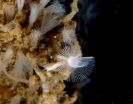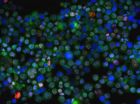(Press-News.org) The horseshoe worm is a worm-like marine invertebrate inhabiting both hard and soft substrates such as rock, bivalve shells, and sandy bottom. The name "horseshoe" refers to the U-shaped crown of tentacles which is called "lophophore." Horseshoe worms comprise a small phylum Phoronida, which contains only ten species decorating the bottom of the oceans.
The new species Phoronis emigi, the eleventh member of the group described in the open access journal ZooKeys, comes after a long 62 year gap of new discoveries in the phylum. It is unique in the number and arrangement of body-wall muscle bundles and the position of the nephridia which is the excretory organ of some invertebrates. The new species is morphologically similar to sand-dwelling species Phoronis psammophila and it is also closely related to Phoronis hippocrepia, which inhabits hard substrate.
The morphology of the topotypes for Phoronis ijimai is also described in this study after 117 years since its original description. The combination of a detailed observation of the internal morphologies and the molecular phylogenetic analyses including the topotypes ensure a synonymy between P. ijimai and the northeastern pacific species Phoronis vancouverensis that has long been disputed.
"It is necessary to use both internal anatomy and molecular data for reveal the global diversity of horseshoe worm. The known phoronid diversity still remains low, with all specimens reported from limited habitats and the localities by the limited reports. Investigations at new localities or habitats may yield additional species in the future", explains Dr Masato Hirose, Atmosphere and Ocean Research Institute, The University of Tokyo, Japan.
INFORMATION:
Original source
Hirose M, Fukiage R, Katoh T, Kajihara H (2014) Description and molecular phylogeny of a new species of Phoronis (Phoronida) from Japan, with a redescription of topotypes of P. ijimai Oka, 1897. ZooKeys 398: 1. doi: 10.3897/zookeys.398.5176
A new species of horseshoe worm discovered in Japan after a 62 year gap
2014-04-04
ELSE PRESS RELEASES FROM THIS DATE:
Recurrent head and neck tumors have gene mutations that could be vulnerable to cancer drug
2014-04-04
SAN DIEGO, April 4, 2014 – An examination of the genetic landscape of head and neck cancers indicates that while metastatic and primary tumor cells share similar mutations, recurrent disease is associated with gene alterations that could be exquisitely sensitive to an existing cancer drug. Researchers from the University of Pittsburgh Cancer Institute (UPCI) and Yale University School of Medicine will share their findings during a mini-symposium Sunday at the American Association for Cancer Research Annual Meeting 2014.
About 50 percent of patients diagnosed with head ...
Common breast cancer subtype may benefit from personalized treatment approach
2014-04-04
SAN DIEGO, April 4, 2014 – The second-most common type of breast cancer is a very different disease than the most common and appears to be a good candidate for a personalized approach to treatment, according to a multidisciplinary team led by scientists at the University of Pittsburgh Cancer Institute (UPCI), a partner with UPMC CancerCenter.
Invasive lobular carcinoma, characterized by a unique growth pattern in breast tissue that fails to form a lump, has distinct genetic markers which indicate drug therapies may provide benefits beyond those typically prescribed for ...
Plant-derived anti-cancer compounds explained at national conference
2014-04-04
SAN DIEGO, April 4, 2014 – Compounds derived from plant-based sources — including garlic, broccoli and medicine plants — confer protective effects against breast cancer, explain researchers at the University of Pittsburgh Cancer Institute (UPCI), partner with the UPMC CancerCenter.
In multiple presentations Sunday at the American Association for Cancer Research (AACR) Annual Meeting 2014, UPCI scientists will update the cancer research community on their National Cancer Institute (NCI)-funded findings, including new discoveries about the mechanisms by which the plant-derived ...
Genetic testing beneficial in melanoma treatment
2014-04-04
SAN DIEGO, April 4, 2014 – Genetic screening of cancer can help doctors customize treatments so that patients with melanoma have the best chance of beating it, according to the results of a clinical trial by researchers at the University of Pittsburgh Cancer Institute (UPCI), a partner with UPMC CancerCenter.
The trial, funded by the National Institutes of Health (NIH), will be presented Monday at the American Association for Cancer Research (AACR) Annual Meeting 2014. It showed that the cancer immune therapy drug ipilimumab appears most likely to prevent recurrence ...
Combining cell replication blocker with common cancer drug kills resistant tumor cells
2014-04-04
SAN DIEGO, April 4, 2014 – Researchers from the University of Pittsburgh Cancer Institute (UPCI), a partner with UPMC CancerCenter, have found that an agent that inhibits mitochondrial division can overcome tumor cell resistance to a commonly used cancer drug, and that the combination of the two induces rapid and synergistic cell death. Separately, neither had an effect. These findings will be presented Monday at the annual meeting of the American Association for Cancer Research Annual Meeting 2014.
"In our earlier work, we found that blocking production of a protein called ...
International consortium discovers 2 genes that modulate risk of breast and ovarian cancer
2014-04-04
Today we know that women carrying BCRA1 and BCRA2 gene mutations have a 43% to 88% risk of developing from breast cancer before the age of 70. Taking critical decisions such as opting for preventive surgery when the risk bracket is so wide is not easy. Spanish National Cancer Research Centre (CNIO) researchers are conducting a study that will contribute towards giving every woman far more precise data about her personal risk of suffering from cancer.
The paper has been authored by 200 researchers from 55 research groups from around the world and describes two new genes ...
Screening reveals additional link between endometriosis and ovarian cancer
2014-04-04
SAN DIEGO, April 4, 2014 – Some women with endometriosis, a chronic inflammatory disease, are predisposed to ovarian cancer, and a genetic screening might someday help reveal which women are most at risk, according to a University of Pittsburgh Cancer Institute (UPCI) study, in partnership with Magee-Womens Research Institute (MWRI).
Monday at the American Association for Cancer Research (AACR) Annual Meeting 2014, UPCI and MWRI researchers will present the preliminary results of the first comprehensive immune gene profile exploring endometriosis and cancer.
"A small ...
Grandparents may worsen some moms' baby blues
2014-04-04
Does living with grandparents ease or worsen a mothers' baby blues? The answer may depend on the mother's marital status, a new study from Duke University suggests.
Married and single mothers suffer higher rates of depression when they live in multi-generational households in their baby's first year of life, the study found. But for moms who live with their romantic partners but aren't married, having one or more grandparents in the house is linked to lower rates of depression.
The pattern held true for rich, poor and middle class women. The findings varied by race, ...
Toward a clearer diagnosis of chronic fatigue syndrome
2014-04-04
Researchers at the RIKEN Center for Life Science Technologies, in collaboration with Osaka City University and Kansai University of Welfare Sciences, have used functional PET imaging to show that levels of neuroinflammation, or inflammation of the nervous system, are higher in patients with chronic fatigue syndrome than in healthy people.
Chronic fatigue syndrome, which is also known as myalgic encephalomyelitis, is a debilitating condition characterized by chronic, profound, and disabling fatigue. Unfortunately, the causes are not well understood.
Neuroinflammation ...
New study on the crime risk on London Underground
2014-04-04
A UNIVERSITY of Huddersfield criminologist who has been working closely with authorities in London to cut crime on one of the world's busiest transport systems will appear before a House of Commons select committee to describe his findings. Dr Andrew Newton is also forming links with overseas experts so that their research can make public transport systems around the world safer places to travel.
By analysing crime patterns on the London Underground, which carries more than one billion passengers a year, Dr Newton is able to draw conclusions about the environment of ...




